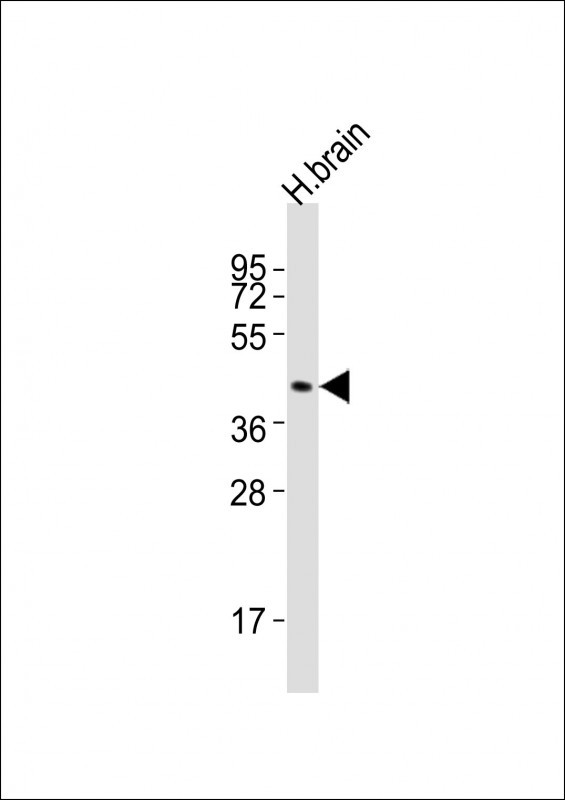
| WB | 1/2000 | Human,Mouse,Rat |
| IF | 咨询技术 | Human,Mouse,Rat |
| IHC | 咨询技术 | Human,Mouse,Rat |
| ICC | 技术咨询 | Human,Mouse,Rat |
| FCM | 咨询技术 | Human,Mouse,Rat |
| Elisa | 咨询技术 | Human,Mouse,Rat |
| Aliases | D(2) dopamine receptor, Dopamine D2 receptor, DRD2 |
| Entrez GeneID | 1813 |
| WB Predicted band size | 50.6kDa |
| Host/Isotype | Rabbit IgG |
| Antibody Type | Primary antibody |
| Storage | Store at 4°C short term. Aliquot and store at -20°C long term. Avoid freeze/thaw cycles. |
| Species Reactivity | Human, Mouse |
| Immunogen | This DRD2 antibody is generated from rabbits immunized with a KLH conjugated synthetic peptide between 307-336 amino acids from the C-terminal region of human DRD2. |
| Formulation | Purified antibody in PBS with 0.05% sodium azide. |
+ +
以下是3篇关于DRD2抗体的代表性文献及其摘要概括:
1. **"Selective D2 and D3 receptor antagonists oppositely modulate immune responses"**
*作者:Yan Y. et al. (2015)*
摘要:研究利用DRD2特异性抗体(克隆号:A-5)通过Western blot和免疫荧光分析,验证了多巴胺D2受体(DRD2)在免疫细胞中的表达,发现DRD2拮抗剂通过调节T细胞功能影响炎症反应。
2. **"Antibody-based analysis of dopamine receptor localization in the murine brain"**
*作者:Boehm M.A. et al. (2018)*
摘要:通过比较多种市售DRD2抗体(如Sigma-Aldrich的D2R-101)的交叉反应性,优化了小鼠脑组织切片中DRD2的免疫组化检测方法,揭示了其在纹状体和前额叶皮层的分布差异。
3. **"Structural insights into the human D1 and D2 dopamine receptor signaling complexes"**
*作者:Zhuang Y. et al. (2021)*
摘要:采用冷冻电镜技术结合DRD2特异性纳米抗体(合成抗体NbD2),解析了DRD2与Gi蛋白复合物的高分辨率结构,为靶向DRD2的药物设计提供了新依据。
4. **"Validation of dopamine receptor antibodies using knockout mouse models"**
*作者:Joshi A. et al. (2019)*
摘要:通过DRD2基因敲除小鼠模型,验证了多种商业DRD2抗体(如Abcam ab85367)的特异性,发现部分抗体在野生型与敲除组织中存在非特异性结合,提示抗体选择对实验结果的关键影响。
这些文献覆盖了DRD2抗体的应用场景(如蛋白质检测、结构研究)、技术验证(如抗体特异性测试)及功能机制探索,可作为相关研究的参考基础。
The dopamine D2 receptor (DRD2) is a G protein-coupled receptor (GPCR) predominantly expressed in the central nervous system, particularly in the striatum, nucleus accumbens, and cerebral cortex. It plays critical roles in regulating motor control, reward pathways, cognition, and emotional responses, and is a primary target for antipsychotic drugs. DRD2 antibodies are essential tools for studying its expression, localization, and function in both physiological and pathological contexts. These antibodies are widely used in techniques like immunohistochemistry, Western blotting, and flow cytometry to investigate DRD2 distribution in brain tissues, cellular models, or transfected systems.
Research involving DRD2 antibodies has advanced understanding of neuropsychiatric disorders such as schizophrenia, Parkinson's disease, and addiction, where DRD2 dysregulation is implicated. Challenges in antibody development include ensuring specificity due to structural similarities among dopamine receptor subtypes (e.g., DRD2 vs. DRD3) and distinguishing between its two major isoforms (D2S and D2L). Validated antibodies often target extracellular loops or C-terminal regions with minimal cross-reactivity. Recent applications extend to drug discovery, biomarker studies, and exploring DRD2's role in non-neural tissues, such as the immune system and cancer. However, variability in antibody performance across experimental conditions underscores the need for rigorous validation using knockout controls or orthogonal methods.
×